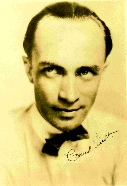
The Conrad Veidt Society
That's quite a fascinating portrait you draw of Conrad Veidt. You present him as this mysterious, almost sinister figure, yet underneath there is also this great compassion. And as the leader of a certain group of Reinhardt's theater students, he takes Murnau and Hans and some of the other boys on a nighttime crawl through Berlin's gay clubs. Of course in 1919 Veidt starred in Different From All the Others, which did make him something of a gay icon. But I'm wondering what are your sources for your portrayal of him, and how did you envision him?
There were two things that focused my attention on Veidt, besides his obvious prominence
in the film world. One was Different From All the Others. When I went to Frankfurt
and Berlin, I realized that when he became a homosexual icon, simultaneously he became
an icon for speaking out for compassion. I came across a lot of interviews with Veidt
where he talked about the need for compassion and understanding and why he decided
to make this film. Then, when I was going over the very beginnings of Murnau's career,
I began to realize that Veidt had done an awful lot to facilitate the Murnau's first
films -
You have a line where where Veidt says that if he is asked what his nature is, he calls himself musical. That's exactly how Christopher Isherwood's uncle describes himself in Christopher and His Kind. Did you borrow that from that book?
I think that's where it comes from. It seemed perfect for my fictionalized Veidt to show that quality of pretending, in a kind of urbane way, that he's not answering the question but at the same time he is answering the question. That seemed to me absolutely essential towards my understanding of Veidt, so that's where that came from. Again, he's maintaining an illusion; we're all being very urbane and witty and not speaking directly. Anybody hearing that sentence would know what he meant.
Did watching Veidt's films affect your portrayal of him?
Yes, I think so. I knew that some readers would have an experience of Veidt from The Cabinet of Dr. Caligari. A lot of people don't even remember the later part of his career, except for Casablanca. But I thought if there was any visual image of Veidt that I would need to plug into, it would be the famous image of Cesare. For example, in the scene where they're attending Reinhardt's party, that's really the visual Conrad Veidt that I'm describing, when somebody says that Murnau and Veidt, who were both very tall, stand out above the crowd and that Veidt looks like somebody who always wears black and tries to affect a sinister and tragic air. I read that someone accused Veidt of always wanting to do that, but I never read anywhere that Veidt always wore black. I don't even have any evidence that he wore black all the time at that point in his life. What I was trying to do is call up in a pleasurable way for the reader Veidt's performance in The Cabinet of Dr. Caligari.
How about Murnau's own films -
I think Murnau has. That began well before I started writing this book. What's often said about Nosferatu as opposed to something like The Cabinet of Dr. Caligari is the way Murnau enlisted nature itself in the service of the supernatural, and that, I think, had a huge effect on me. The idea that he could simply pan a range of mountains and in the proper context, with the proper filming, make me feel that in some ways those mountains were part of some sort of diabolical cabal, was not only a huge contribution to film history, but a huge contribution to my own aesthetic. The ways in which The Cabinet of Dr. Caligari unsettles us are pretty easy to figure out; there's not a right angle in the movie. But the ways in which Nosferatu unsettles us, even when the vampire's not on screen, are awfully intriguing. In one point in section of the novel where Murnau is filming Nosferatu, I talk about the way Alexander Granach as Knock brings the diabolism closer to home. When I watched that film again, it struck me how striking it was that Knock, as a character, even in the way he's been introduced, seems to have been dropped in right out of The Cabinet of Caligari. I don't think that could be a coincidence, but it does seem to point out for Murnau's dimmer viewers, myself included, the way he could have taken this in a much more traditionally expressionist direction. But instead he merged this tradition of expressionism into a much subtler thing.
Thank you for taking so much time to talk to me. I really appreciate it.
Thank you!
An interview with a Nosferatu
Continued